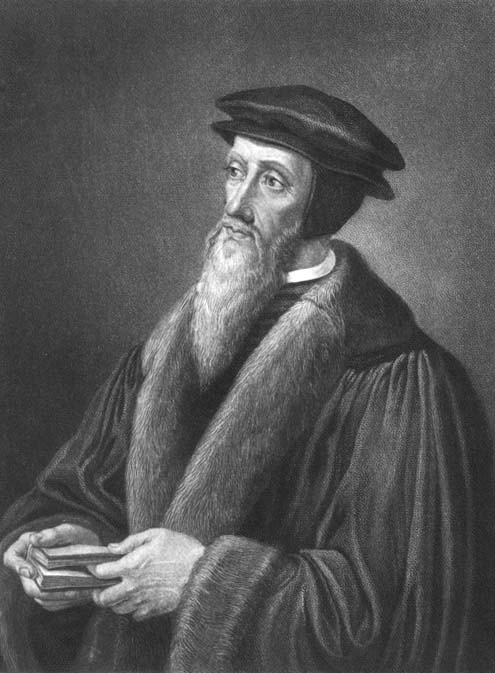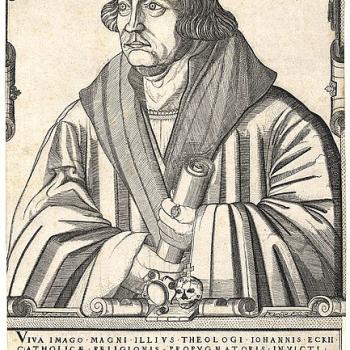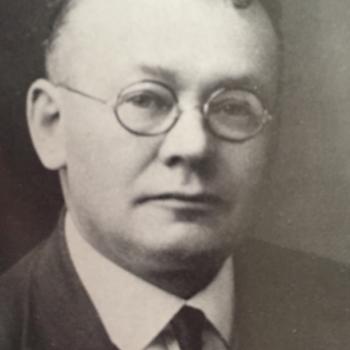Portrait of John Calvin (1509-1564 ) from the 16th century (unknown) [public domain / Wikimedia Commons]
* * *
(9-17-09)
* * *
This paper deals with John Calvin’s arguments in Institutes of the Christian Religion, Book IV, 12:23-28 (using the online public domain version). I’ve abridged his portions in a few portions for the sake of better flow of dialogue. Anyone wishing to read all his words or see the complete context can consult the online version. Calvin’s words will be in blue.
* * * * *
In one thing they are more than rigid and inexorable—in not permitting priests to marry. It is of no consequence to mention with what impunity whoredom prevails among them, and how, trusting to their vile celibacy, they have become callous to all kinds of iniquity.
***
The prohibition, however, clearly shows how pestiferous all traditions are, since this one has not only deprived the Church of fit and honest pastors, but has introduced a fearful sink of iniquity, and plunged many souls into the gulf of despair.
***
Anyone who is not called to celibacy should avoid it, and get married. Is this not utterly obvious? Priests are not pressed into service at gunpoint, or involuntarily castrated. One wearies of the continual nonsense that is spouted by Protestants in their detestation of a wonderfully pious practice.
***
Certainly, when marriage was interdicted to priests, it was done with impious tyranny, not only contrary to the word of God, but contrary to all justice.
***
First, men had no title whatever to forbid what God had left free;
***
Then why did Calvin rule Geneva with such a dictatorial hand, if he was so intensely concerned with personal freedom?
***
secondly, it is too clear to make it necessary to give any lengthened proof that God has expressly provided in his Word that this liberty shall not be infringed. I omit Paul’s injunction, in numerous passages, that a bishop be the husband of one wife;
***
Sure; if a bishop is married at all. He should not be guilty of bigamy or divorce and “remarriage”! That doesn’t mean that the Church has no jurisdiction to require celibacy if she so desires.
***
Why this is the least bit controversial has always been a complete puzzle to me. I can only chalk it up to good old prejudice. It’s a way to lie about and bash the Catholic Church, and it is an emotional subject, so it is used for propaganda, with little regard for reason or biblical rationale. It plays well to the crowds. It’s demagoguery, pure and simple.
***
The ascetic tendencies indicated by these prohibitions developed earlier than these Epistles among the Essenes . . . who repudiated marriage except as a necessity for preserving the race, and allowed it only under protest and under stringent regulations . . . The prohibitions above named were imposed by the later Gnosticism of the second century.
(Marvin Vincent, Word Studies in the New Testament, Grand Rapids, Michigan: Eerdmans, 1980 [originally 1887], Vol. IV, 245)
See Col. 2:16, 21f., where Paul condemns the ascetic practices of the Gnostics. The Essenes, Therapeutae and other oriental sects forbade marriage. In 1 Cor. 7 Paul does not condemn marriage.
(A. T. Robertson, Word Pictures in the New Testament, Nashville, Tennessee: Broadman Press, 1931, Vol. IV, 578)
The assertions of these verses are significant when studied in relation to the Gnostic and dualistic views that matter is evil and not created by God.
(The Eerdmans Bible Commentary, edited by D. Guthrie et al, Grand Rapids, Michigan: Eerdmans, 3rd edition, 1970, 1173)
We have therefore a prophecy, a sacred oracle of the Holy Spirit, intended to warn the Church from the outset against perils, and declaring that the prohibition of marriage is a doctrine of devils.
We agree, and we deny that this applies to the Catholic position. Calvin — perhaps because of his rush to condemn Catholicism from top to bottom — doesn’t grasp the fundamental distinctions involved.
***
Much better. This approaches a position of actually understanding that which he opposes.
***
But it’s not, because our position (rightly understood) is also St. Paul’s. If Calvin wants to attack it, he should, to be consistent, go after Paul too. But of course he does not. He’d rather play sophistical games.
***
I repeat: all institutions impose rules and regulations. All organizations have entrance requirements. It is a part of life and reality. The Catholic Church has a perfect right and liberty under God to have this restriction, based on the teachings of St. Paul. I don’t think it is even arguable. This discussion is often conducted on a purely irrational, emotional plane.
***
Luke 18:28-20 And Peter said, “Lo, we have left our homes and followed you.” [29] And he said to them, “Truly, I say to you, there is no man who has left house or wife or brothers or parents or children, for the sake of the kingdom of God, [30] who will not receive manifold more in this time, and in the age to come eternal life.”
Why should we Catholics disagree with Jesus? The Catholic Church is not even requiring this much. She doesn’t command a man to leave his wife or children or parents. Rather, she accepts men who have already felt the call or vocation of celibacy. Again, Calvin’s beef is with Jesus Himself, Who sanctioned far more of a “deprivation of liberty” or “imprisoning conscience” than the Catholic Church ever supposedly did.
***
At times there have been married bishops, because this is a disciplinary matter, not a dogmatic one. It’s neither here nor there.
***
I am aware of the mode in which they expound this—viz. that no one was to be appointed a bishop who had a second wife. This interpretation, I admit, is not new; but its unsoundness is plain from the immediate context, which prescribes the kind of wives whom bishops and deacons ought to have. Paul enumerates marriage among the qualities of a bishop; . . .
***
We have married priests today in the Eastern Rites, and there have been married bishops in the past. Both/and. But Calvinism and general Protestantism sure don’t have much of a tradition of single pastors, do they? They accept one-half of Paul’s teaching and not the other, and this is the problem.
***
None, but it is irrelevant to the point at hand.
***
How, then, dare they have the effrontery to give the name of unclean and polluted to that which furnishes a bright representation of the spiritual grace of Christ?
***
Matthew 19:10-12 The disciples said to him, “If such is the case of a man with his wife, it is not expedient to marry.” [11] But he said to them, “Not all men can receive this saying, but only those to whom it is given. [12] For there are eunuchs who have been so from birth, and there are eunuchs who have been made eunuchs by men, and there are eunuchs who have made themselves eunuchs for the sake of the kingdom of heaven. He who is able to receive this, let him receive it.”
Obviously, then, Calvin and many Protestants are among those who can’t “receive” this plain teaching of Jesus. That’s not our problem, that they are so unwilling to accept certain parts of inspired divine revelation. We show no such reluctance and lack of faith and trust in God’s designs.
***
Really? I should think that the truth is clearly quite the opposite, once all the relevant biblical data is examined, and clear thinking brought to bear, rather than irrational emotionalism and a slanderous anti-Catholic motivation.
***
they, however, find something in the Scriptures to defend it. The Levitical priests, as often as their ministerial course returned, behoved to keep apart from their wives, that they might be pure and immaculate in handling sacred things; and it were therefore very indecorous that our sacred things, which are more noble, and are ministered every day, should be handled by those who are married: as if the evangelical ministry were of the same character as the Levitical priesthood. . . . the apostle declares distinctly, without reservation, “Marriage is honourable in all, and the bed undefiled; but whoremongers and adulterers God will judge” (Heb. 13:4). And the apostles showed, by their own example, that marriage is not unbefitting the holiness of any function, however excellent; for Paul declares, that they not only retained their wives, but led them about with them (1 Cor. 9:5).
***
Why is 1 Corinthians 7 overlooked throughout the entire section of Calvin’s wrongheaded, unbiblical rantings against celibacy? The Levitical priests offer one analogy, but Calvin neglects to see it based on sweeping bigotry [a portion of the deleted portion above]: “ecclesiastical pastors do not sustain this character in the present day.” This is hardly intellectually impressive.
***
Who is not paying attention? Calvin has ignored 1 Corinthians 7, and he has ignored the fact of Paul’s and the twelve disciples’ celibacy and separation from wives in some cases, for the sake of ministry.
***
Nothing, as it is irrelevant: celibacy being a matter of discipline, not dogma.
***
St. Paul’s express teachings are superstitious novelties? That is an odd (beyond bizarre) thing for a Protestant to imply.
***
What was resolved? The opinion of Paphnutius was adopted, who pronounced legitimate conjugal intercourse to be chastity (Hist. Trip. Lib. 2 c. 14). The marriage of priests, therefore, continued sacred, and was neither regarded as a disgrace, nor thought to cast any stain on their ministry.
***
They were less conformed to the Pauline model in those days, but that doesn’t mean the Pauline model cannot be followed should the Church decide to make it normative.
***
No; only from Calvin’s dichotomous “either/or” mentality does this follow. Catholics think in “both/and” terms.
***
We can strive for perfection in whatever state of life God has called us to.
***
That is, just as Jesus Himself sanctioned (Luke 18:29).
***
Scripture itself: the words of our Lord and the Apostle Paul carry as much weight in the scheme of things as the prevailing practices of the early Church (assuming for the sake of argument that it was as Calvin describes).
***
Hence, the Western, Latin Rites in Catholicism take one path, and the Eastern Rites another. Both/and. But Protestantism mostly teaches Only, only. Celibacy is frowned upon, especially in pastors, and this is an unbiblical, un-Pauline attitude.
***
***All good Christians desire such a reform in the clergy and in all Christians; indeed all men, if it were possible.
***
. . . the better-hearted may understand the effrontery of our enemies in employing the name of antiquity to defame the holy marriage of priests. In regard to the Fathers, whose writings are extant, none of them, when they spoke their own mind, with the exception of Jerome, thus malignantly detracted from the honour of marriage.
That’s what I have been contending: Catholics think very highly of marriage!
***
We will be contented with a single passage from Chrysostom, because he being a special admirer of virginity, cannot be thought to be more lavish than others in praise of matrimony. Chrysostom thus speaks: “The first degree of chastity is pure virginity; the second, faithful marriage. Therefore, a chaste love of matrimony is the second species of virginity” (Chrysost. Hom. de Invent. Crucis.).
Chastity is not confined to the unmarried, because it is ultimately a state of heart and mind.














